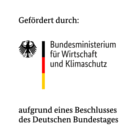IGF 20785 N

| Period: | 01.11.2019 – 30.04.2022 |
|---|---|
| Partner: | |
| Funder: |
Arbeitsgemeinschaft industrieller Forschungsvereinigungen (AiF) |
| Project Manager: | Dr. Adrian Anthes |
| Team: | Applied Electrochemistry |
With the help of steadily improved trace analysis, pharmaceuticals and their metabolites can be detected in surface water or in drinking water since several years. The origin of these substances is on the one hand in the production of active ingredients (rinsing and process waters) on the other hand, they are metabolized and excreted by the patients. Although in sewage treatment plants a strong dilution occurs, however in surface waters these substances accumulate, due to their poor biodegradability. Cytostatic agents and magnetic resonance imaging contrast agents are not only harmful to the environment but also contain the rare precious metals gadolinium and platinum, which are bound as organic complexes in the pharmaceuticals.
The aim of the "MeGaPlan" project, which is being worked on in cooperation with the Fraunhofer IWKS, is the purification of gadolinium- and platinum-containing pharmaceutical wastewater, the recovery of precious metals and the degradation of organic compounds.
In this project, the substances are to be removed from the waste water by the use of novel magnetic adsorbers. For this purpose, magnetic nanocomposite particles are modified with an adsorbent material in order to achieve targeted removal of the substances from the water. In addition, the electrical conductivity of the particles should be used in order to increase the selectivity and capacity of the adsorber via potential-controlled adsorption. The adsorbed substances are subsequently desorbed and the particles are thereby regenerated. From the concentrated solutions, the metals can be recovered efficiently by electrochemical deposition and the remaining organic compounds are decomposed at boron-doped diamond electrode (BDD).
back

Das IGF-Vorhaben Nr. IGF 20785 N der Forschungsvereinigung DECHEMA e.V., Theodor-Heuss-Allee 25, 60486 Frankfurt am Main wurde über die AiF im Rahmen des Programms zur Förderung der industriellen Gemeinschaftsforschung (IGF) vom Bundesministerium für Wirtschaft und Klimaschutz aufgrund eines Beschlusses des Deutschen Bundestages gefördert.